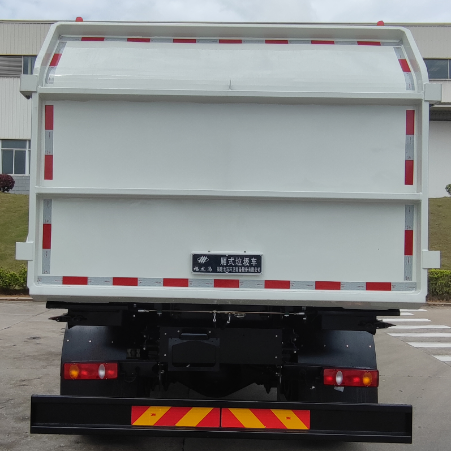In today’s world, sustainability is more than just a buzzword, it’s a necessity. With the alarming rise in pollution and climate change, cities around the globe are searching for innovative ways to minimize their carbon footprint. Waste management, a critical component of urban living, is undergoing a green transformation. Enter eco-friendly rubbish bin trucks—vehicles designed not only to collect our trash but also to do so in a way that is kind to our planet. These trucks are at the forefront of a movement towards cleaner, greener cities, showcasing the perfect blend of technology and environmental stewardship.
Garbage collection, though essential, has traditionally been a dirty job, both literally and figuratively. Diesel-powered trucks are notorious for emitting harmful pollutants such as nitrogen oxides (NOx) and particulate matter (PM), which contribute to smog and respiratory problems. By transitioning to eco-friendly rubbish bin trucks, we can significantly cut down on these emissions, leading to cleaner air and healthier communities. Moreover, reducing the reliance on fossil fuels helps combat climate change by lowering greenhouse gas emissions.

Key Technological Advancements
The journey towards eco-friendly rubbish bin trucks has been marked by several key technological advancements. Electric trucks, powered by batteries, offer a clean and quiet alternative to diesel engines. Hybrid trucks combine traditional internal combustion engines with electric motors to reduce fuel consumption and emissions. CNG trucks utilize natural gas, which burns cleaner than diesel, producing fewer pollutants. Additionally, innovations such as smart routing systems help optimize collection routes, reducing fuel use and operational costs.
Benefits of Eco-Friendly Rubbish Bin Trucks
The benefits of eco-friendly rubbish bin trucks extend beyond just environmental impact. Here are some of the key advantages:
- Reduction in Greenhouse Gas Emissions: By using cleaner energy sources, these trucks significantly lower the emission of CO2 and other greenhouse gases.
- Improved Air Quality: Less air pollution means healthier living conditions for urban residents.
- Lower Noise Pollution: Electric and hybrid trucks operate more quietly than their diesel counterparts, reducing noise levels in residential areas.
- Cost Savings: Though the initial investment may be higher, eco-friendly trucks can save money in the long run through lower fuel costs and maintenance expenses.
- Enhanced Public Image: Municipalities and companies that adopt green technologies demonstrate their commitment to sustainability, which can enhance their reputation.
Types of Eco-Friendly Rubbish Bin Trucks
Eco-friendly rubbish bin trucks come in several types, each with its own set of benefits:
- Electric Rubbish Bin Trucks: Powered entirely by batteries, these trucks produce zero emissions and operate quietly.
- Hybrid Rubbish Bin Trucks: These trucks use a combination of an internal combustion engine and an electric motor to reduce fuel consumption and emissions.
- Compressed Natural Gas (CNG) Trucks: CNG trucks run on natural gas, which burns cleaner than diesel, resulting in lower emissions of NOx and PM.
- Solar-Powered Trucks: Though still in the experimental stage, some trucks are being equipped with solar panels to supplement their energy needs.
Innovative Features of Eco-Friendly Rubbish Bin Trucks
Eco-friendly rubbish bin trucks are packed with innovative features that enhance their efficiency and sustainability:
- Advanced Compaction Systems: These systems increase the amount of waste that can be collected per trip, reducing the number of trips needed.
- Smart Routing Technology: GPS and software optimize collection routes, saving fuel and time.
- Regenerative Braking: This technology recovers energy during braking and uses it to recharge the battery, improving efficiency.
- Lightweight Materials: Using lighter materials for truck construction reduces overall weight, which can improve fuel efficiency.
- Telematics and Data Analytics: These systems monitor truck performance and operational metrics, helping to identify areas for improvement and ensuring optimal efficiency.
Conclusion
Eco-friendly rubbish bin trucks represent a significant step forward in sustainable waste management. By embracing these green technologies, cities can reduce their environmental impact, improve air quality, and set an example for other sectors to follow. As we move towards a more sustainable future, these innovative trucks will play a crucial role in keeping our cities clean and our planet healthy.
FAQs
What are the main benefits of using eco-friendly rubbish bin trucks?
The main benefits include reduced greenhouse gas emissions, improved air quality, lower noise pollution, cost savings over time, and an enhanced public image for municipalities and companies.
How do eco-friendly rubbish bin trucks compare to traditional models in terms of cost?
While eco-friendly trucks may have a higher upfront cost, they offer long-term savings through lower fuel and maintenance costs. Additionally, government incentives and grants can help offset the initial investment.
Are there any drawbacks to using electric or hybrid rubbish bin trucks?
One potential drawback is the limited range of electric trucks, which may not be suitable for very large areas without adequate charging infrastructure. Hybrid trucks, while more efficient than traditional models, still rely partly on fossil fuels.
How can my city transition to using eco-friendly rubbish bin trucks?
Cities can start by conducting a cost-benefit analysis, exploring funding options, and gradually phasing in eco-friendly trucks as older models are retired. Collaboration with manufacturers and other cities can provide valuable insights and support during the transition.
What impact do eco-friendly rubbish bin trucks have on waste collection efficiency?
Eco-friendly rubbish bin trucks can enhance efficiency through features like advanced compaction systems, smart routing technology, and regenerative braking. These innovations help reduce operational costs and improve the overall effectiveness of waste collection.








